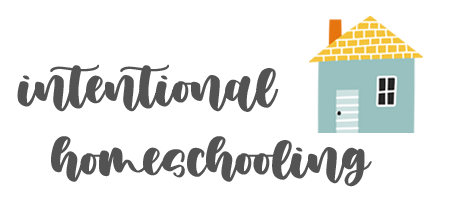COURSE – Unschooling With Intention
WELCOME!
Hello and welcome to my newest homeschool workshop!
Our current homeschool style evolved over the course of a number of years. For a long time I didn’t want to call it unschooling (what a terrible word!), so I called it Homeschooling as a Lifestyle, but as time went on I started to see more and more benefits to jumping into unschooling (though, to clarify, we are not radical unschoolers, more on that in a bit) and because I always like to share our journey this workshop was born!
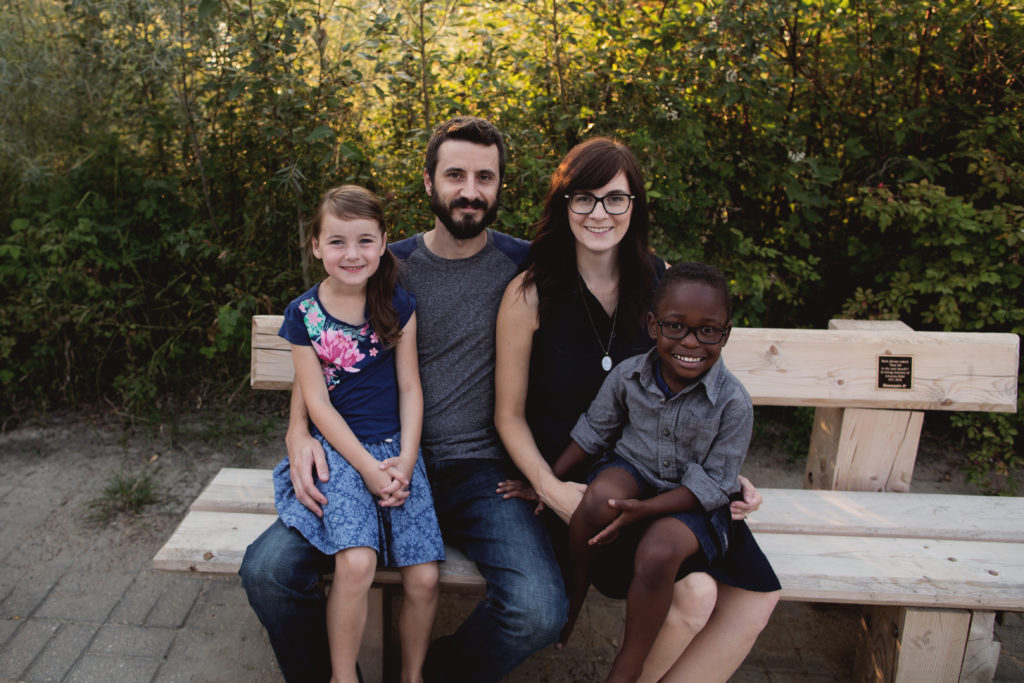
Just as the way of a short introduction, I’m Chantel and I live with my family in the Canadian prairies. My husband, Jared, is a web guy and works for our provincial college. My daughter Raeca is currently nine and loves fantasy books and spends hours each day playing Lego. Ephraim is six and has always been inquisitive and loves to know exactly how things work. Plus, as of last fall, we usually have a foster child or two thrown into our family just to shake things up a bit.
Disclaimer #1 – This is a Rough Draft
Before we dive into this workshop I want to put out a disclaimer and say this is not a final, polished workshop. There is more I want to add, there may be spelling mistakes and it isn’t going to be perfect. I wanted to write this to share about our homeschool journey and some revelations I have made over the years and then COVID-19 blew up.
I have made the decision to make this unpolished-in-the-process version available since I thought it may help some parents who find themselves suddenly homeschooling and may be feeling unprepared for the journey. I thought something, even in its rough form, may be better than nothing.
I plan on adding sections to this workshop each week and refining it over the next few months. If you want to be updated when I add things to it, make sure you are subscribed to my homeschool newsletter, that’s where I tend to announce things first.
Disclaimer #2 – This Method May Not Be For Everyone
My purpose for this workshop is to share what I have learned through my years in the education system as well as through our homeschool journey. I’m not here to say everyone should homeschool nor that everyone should homeschool the way we do. I will challenge some popular beliefs about education and if you disagree with them that is fine, you are more than welcome to educate your children as you see fit.
For those who think learning should have a purpose and are ready to try something a little different, this workshop is for you.
Some of you may already be doing what we are, if so, I hope this workshop will help confirm what you are already doing.
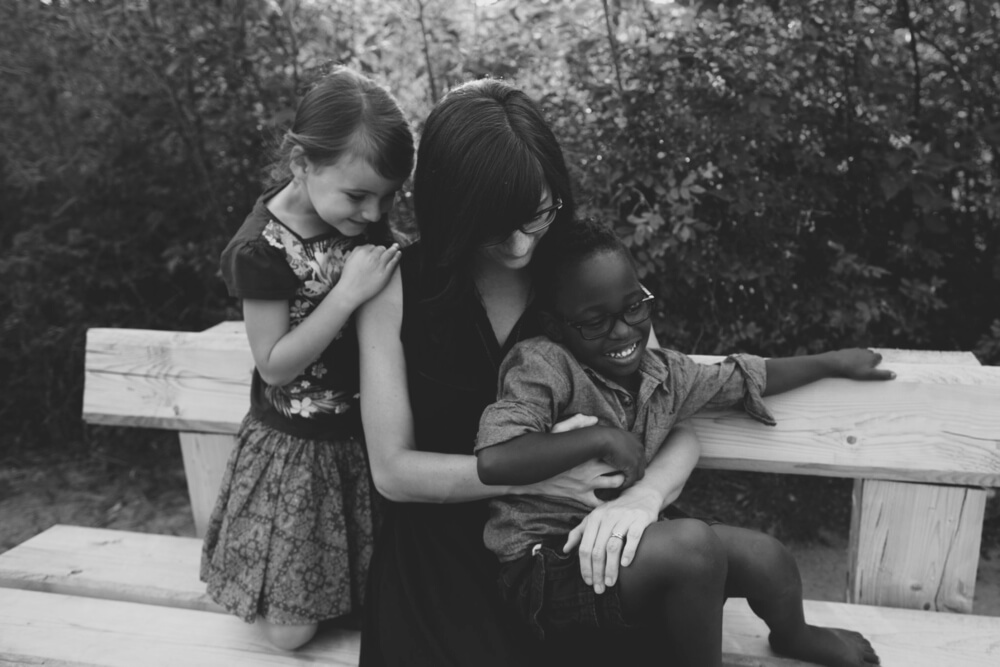
My Educational and Work History
I was educated very differently than the way I am educating my children.
I spent kindergarten until the end of grade four in a public school in a town with less than 1,000 people. I thought school was fine. I mostly remember playing with my friends at recess, going to the principal’s office in kindergarten for pulling a boy into the girls washroom, a few good books teacher’s read aloud to us.
Grade four stick out more in my mind, probably because I was older, the big highlights of the year were our teacher with a major temper, we would say “This is Mr. Carpenter’s temper!” and then squeeze our juice boxes until the juice was all the way to the tip of the straw. I also spent a lot of time with a friend coloring our hands with markers and putting white glue over top, waiting till it dried and peeling the colored glue off our hands. Education wise I remember we learned about local history that year, we made scrapbooks on pioneers and had some great local field trips. Oh, and that was the year I learned that my initials spelled a word: C.A.D.E., but it wasn’t as exciting as the kid whose name spelled H.E.L.L. Also around that time I remember really struggling with spelling. We would have pre-tests and then have a week to study the words, my Dad would make me re-write all the words I got wrong ten times, I a good idea in theory but it never helped, I was terrible at spelling until the last couple years of high school.
For grade five I got into a semi-private Christian school where I went until grade 12. Our grade consisted of 26 students with a couple kids leaving and new ones coming each year but for the most part the class stayed the same. I remember struggling to make friends once I switched schools. I had a different “best friend” each year and I definitely was not always nice to the other girls. I was a tomboy through and through and had little tolerance for girly girls.
I remember hating all things to do with art all through school. In grade six we had to draw a picture of Garfield, I got a great mark – because the teacher didn’t realize I traced it off of the sample she gave us. In grade seven we needed to make a poster of what we wanted to be when we grew up, I chose to be a jeweler because I could just cut rings out of catalogues and glue them to construction paper. In grade nine, the last year I was forced to take art, I almost failed the class because I refused to hand in projects. I was one of the few kids that had to go to the art final where all we did was work on projects we hadn’t finished. I loved being crafty but school ruined my love for art.
Pretty much all through middle school and high school I got in trouble for reading too much. To be fair, I was reading instead of doing my homework, chores and sleeping but I wish I would have been articulate enough to explain how much more useful reading was than doing some of the pointless homework some teachers assigned.
Other school memories from grade five through to twelve mostly include chatting with friends, not much educational.
My grades throughout high school were fine, I averaged in the low 80’s because I just didn’t see the point of so much of what we learned so I didn’t try. I rarely studied for tests. My marks in math for a few years were in the 60’s because I just didn’t understand the way our teacher taught us, the next year we had a different teacher and my grades jumped up about 25%, I even took calculus in during lunch hour from that same teacher in grade twelve and did really well. One semester in grade eleven my school offered psychology which I was so excited about, finally a class I enjoyed! I got something in the high 90’s in that class.
I didn’t know what I wanted to do after school, I was kind of torn between teaching and social work. I decided to take a one year program in a local college that I thought would help me decide, it was in the social work field and since I already had an idea of what schools and teaching was like I thought it would help me see the other side. I got accepted for the following year so with my gap year I went off to England to be a nanny for a bit.
The year I spent in college was great. I loved each and every class and had the highest marks in the program. I got two scholarships that I didn’t even apply for based on my marks alone, one that paid my tuition and one that paid for my books.
After that program I knew I wanted to go to university and I had decided on teaching over social work, mostly because I knew I wanted to have kids and you really can’t beat teacher hours and summers off.
I squeezed four years of university into two and a half years, I took extra classes during the regular semesters, took summer classes and took online classes through other universities when my university wouldn’t allow me to take more credits in one semester. One summer, six months after getting married I was taking full time classes at university (half an hour from my home), working a full time job (45 minutes from university and another 30 minutes from my home) and I was started a photography business so I spent a few weekends driving all over our province photographing weddings. It was a crazy season and that’s kind of how my two and a half years of university looked.
When it came to the academic side of university, it was a joke. It was all pointless theory (minus one class that I loved), I spent a lot of time sitting at the back of the classroom playing games on my laptop. To me, university felt like a money grab – just people taking my money because I needed the classes to get my teaching certificate.
After graduating from university I went straight into teaching for the next few years. I felt like my degree left me completely unprepared for teaching. We were never shown how to fill out field trip request forms, create report cards or any of the practical teaching skills. So, I taught as I had watched teachers teach in my school years. Looking back I cringe at the assignments and homework I gave my students. Yes, as a teacher you have to stay within the curriculum, but I do think that if I were teaching in a school now I would be much more creative in my methods, but if you haven’t been taught that kids can learn differently you will just default to how you were taught.
All in all, I think I had a pretty typical education. I wasn’t a terrible student, and with the exception of a few subjects that I loved I wasn’t the best student either. I was one of those “between the cracks kids” who didn’t get much attention because I was neither brilliant nor stupid. In my mind school was just something you had to go to. Little did I know I was completely wrong.

Our Homeschool Journey
I stumbled across some homeschoolers on Instagram when my daughter was about a year old and I instantly knew I wanted to do it. Unfortunately my husband was not on board, homeschooling was for weird families, wasn’t it? So, I continued to teach for a number of years, all the while dreaming of homeschooling.
The year our daughter went off to kindergarten was a game changer. Every time I saw her walk up the steps to the bus it just felt so wrong for her to be going to school. She quite enjoyed school and looked forward to playing with her friends each day. I was a substitute teacher in her classroom a few times and it was interesting seeing where she was at compared to her classmates. There were a few times where there would be a group of students sitting around her while she read a story to them all.
At the end of the school year I was doing some testing for the teacher and one of the kids only recognized two of the letters in the alphabet (none of which were even in his name), this child was sent on to grade one with the rest of the class and I remember thinking how difficult that would be for the teacher to teach such a range of abilities.
I think most teachers are amazing people but the truth is, they have to teach towards the middle/low end of the class, which means kids that are ahead are often bored or spend their days re-learning things they already know. This really helped my husband to see that school was not necessarily as vital as we had been led to believe and he was on board with homeschooling once our daughter finished kindergarten.
She finished kindergarten in the middle of June, I started a homeschool blog and we kicked the homeschooling off right away. One thing I see in hindsight is that that summer, and pretty much every summer, we would automatically default to unschooling. We would spend a lot more time outside than in the winter (because we live on the Canadian prairies and I hate the cold so we don’t venture out too much in the winter). But that first year, when the traditional school year came around I ended up trying to make our homeschool look like school in a classroom looks, just at home. In many ways my daughter loved that, she loves to learn and we both had the belief that that is what learning looked like.
Over the years I’ve found we will automatically slip into seasons of unschooling (unintentionally) and then I have started to freak out that my kids will miss something important, or they won’t learn math because we aren’t doing worksheets, etc. So then I’ll reign things in and try to do a unit study or set up a schedule where we “do school” by sitting down at the kitchen table for at least three days a week but it always ended up burning us all out and the kids dreaded my inevitable interruption in their play for us to “do school”.
It wasn’t until recently that I became full committed to the idea of unschooling and as I have I’ve been able to see my kids’ love for learning sky rocket, I’ve realized that this is how we were meant to learn.
Unschooling is a Terrible Term
The technical term for our method of homeschooling is called unschooling. Can we just begin right off the bat by agreeing that is a terrible term? Apparently it was coined that in the 70’s back when 7-Up was trying to push itself to be the “un-Cola” in a war against Coke and Pepsi. The idea of unschooling was one guy’s attempt to push back against the idea of school. Knowing that, it makes more sense, but to me, it doesn’t really make me like the term any more than before.
To those who don’t know what unschooling really means (we’ll get to that next) it often sounds like parents are preventing their kids from learning and that they will end up as those back woods hippies (it won’t unless you are one and are intentionally trying to raise your kids the same). For that reason I try to refrain from using the term when speaking to any non-homeschoolers who may completely understand what I am talking about.
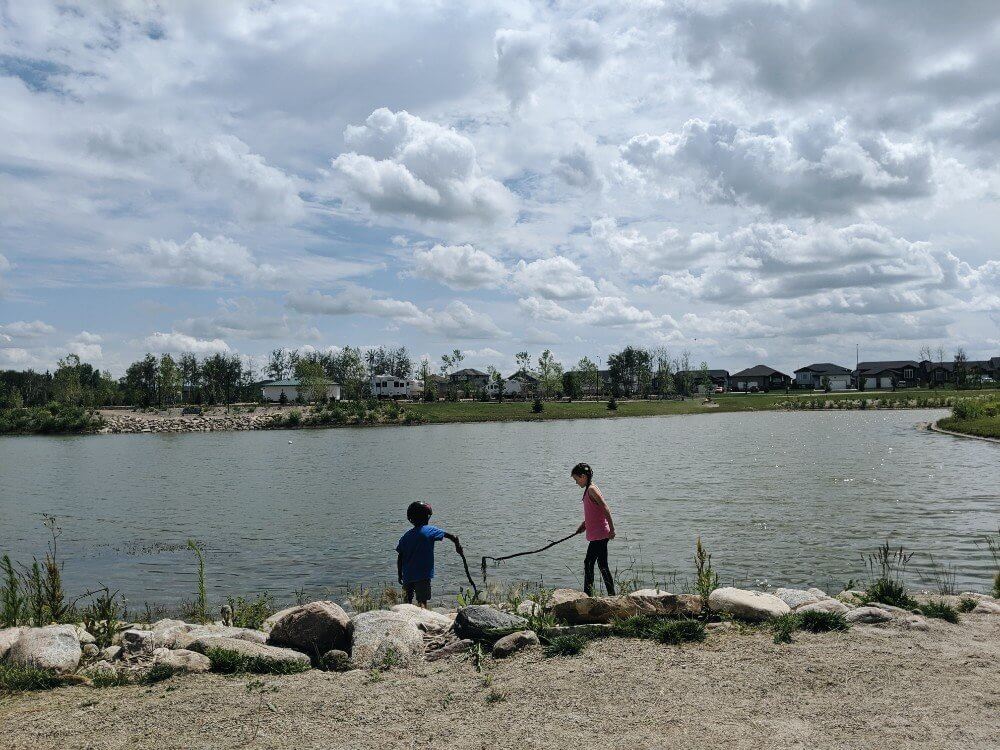
Unschooling Defined – Kind of
Unschooling can be hard to define and some people do have different ideas on what it means but to me, at its core, unschooling means interest-led learning.
To me unschooling is all about listening to and watching my kids and helping them find out their strengths and interests and helping them to develop in these areas. It involves listening to my children and viewing every question they ask as a learning opportunity.
This method of homeschooling involves a lot of trust. You won’t be planning curriculum and plotting learning in advance. You won’t be able to check boxes and know you are “on track”. It goes against the mainstream ideas of school and learning that many of us were raised in so this trust can be hard.
Unschooling changes a parent’s role from teacher to more of a co-learner.
Unschooling defies the notion that you need to be an adult to know what you want to do in life and can only start working towards the goal when you are in the last few years of high school.
Instead of believing every child needs to have the same amount of knowledge on each subject and be a jack-of-all-trades, kids who unschool generally deep dive into a topic of their interest and become masterful at one or two subjects.
In one of my favorite unschooling books; An Unschooling Manifesto, author Marla Taviano defines unschooling like this:
Unschooling: student-led, interest-driven, mostly-fun, super-meaningful education that happens at home (and/or any other place along the way). Parents and other adults are valuable facilitators, but instead of lecturing, they’re sharing from experience and often learning right alongside the kiddos. There’s no set curriculum, no list of things the kids need to know, no replication of school at la casa. Creativity and innovation and community (and all the important stuff in life) are encouraged and nurtured. Kids are celebrated for who God created them to be and inspired to become the very best grown-up version of that unique and amazing person. Unschooling families think school cramps their style; childhood’s too short to spend cooped up in a classroom; and learning happens best in the context of real life. And real life starts right this very minute.
Yup, that sounds about right.
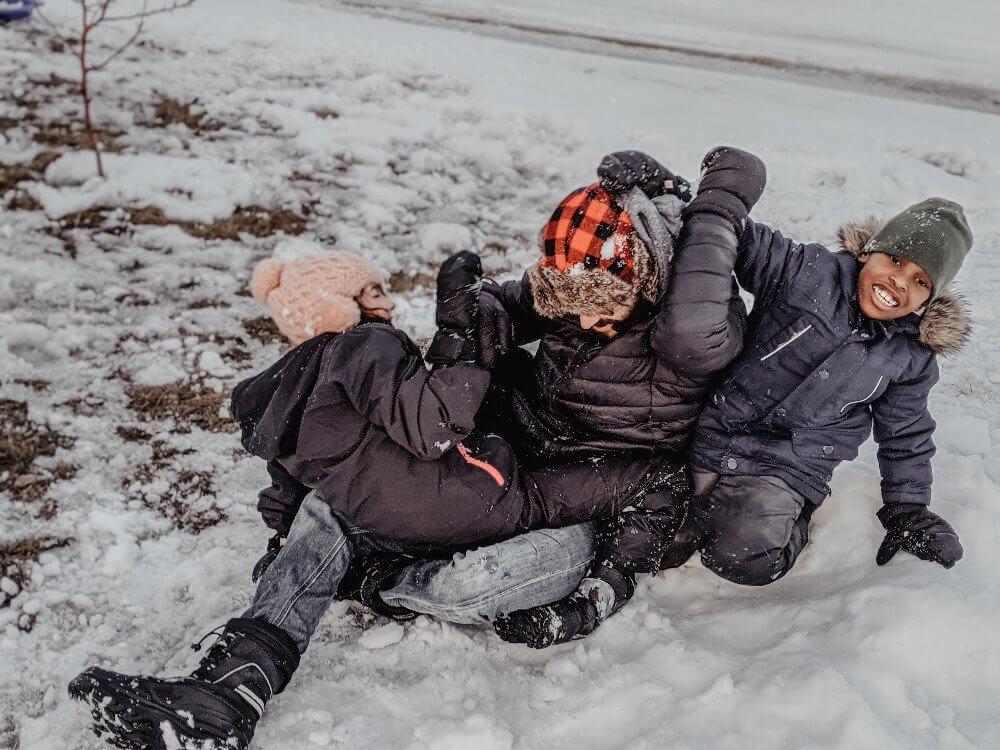
Unschooling is Not Unparenting
There is a (well founded) misconception that unschooling means unparenting.
There are definitely a group of unschoolers who subscribe to this philosophy and they are generally called radical unschoolers. Radical unschoolers generally allow their kids to set their own bed times and meal times, how much screen time they have and just trust the child to make the decisions.
For general (non-radical) unschoolers this is not the case.
We see ourselves as a family before homeschoolers. And since we are a family first that means everyone contributes to the family, we all have chores, eat meals at the same time and our kids have a general bedtime window. Everyone is a contributor to the family, no one is a consumer (okay maybe our foster babies and toddlers are pure consumers, but the big kids and adults aren’t).
What Do You Need to Unschool?
You really don’t need much when it comes to unschooling. Honestly, unschoolers probably use less materials and supplies than regular homeschoolers. And because unschoolers tend to follow their interests, what you need is generally stuff you already have or would eventually collect anyway.
But there are a few things that I think are important to have if you are going to unschool.
The biggest thing I think you need is a willingness to learn alongside your children. This is especially so if your kids are in elementary or the younger middle grades. While it is great to introduce kids to your hobbies and interests, often their own will be different than yours and you will need to put some effort into learning their interests alongside them so you can help to see what resources and supplies they need to progress in their knowledge and mastery in the area.
Then the follow up thing you need is a willingness to actually get them the resources and materials they may need. This may include enrolling them in a local class, looking stuff up together online, getting books from the library, watching YouTube videos (either together or you pre-screening them ahead of time), etc. As unschooling parents we see ourselves as learners with our children, not teachers who tell them what we already know.
There are so many things regular homeschoolers have that are just generally accepted materials (like sight word cards, hundreds charts, multiplication flashcards, etc) that unschoolers don’t need, unless a child shows interest in those materials. I know this is going to be a hard concept for those who went to school or weren’t unschooled growing up, it was a hard concept for me but I have seen the struggle those items have brought and I’ve also seen my kids do things like learn to read and do math on their own when they are interested and they don’t really even realize they are “doing math” or whatever it is they are doing at the moment.
I’m not saying you need to throw all those things away if you have them but they definitely are not necessary.
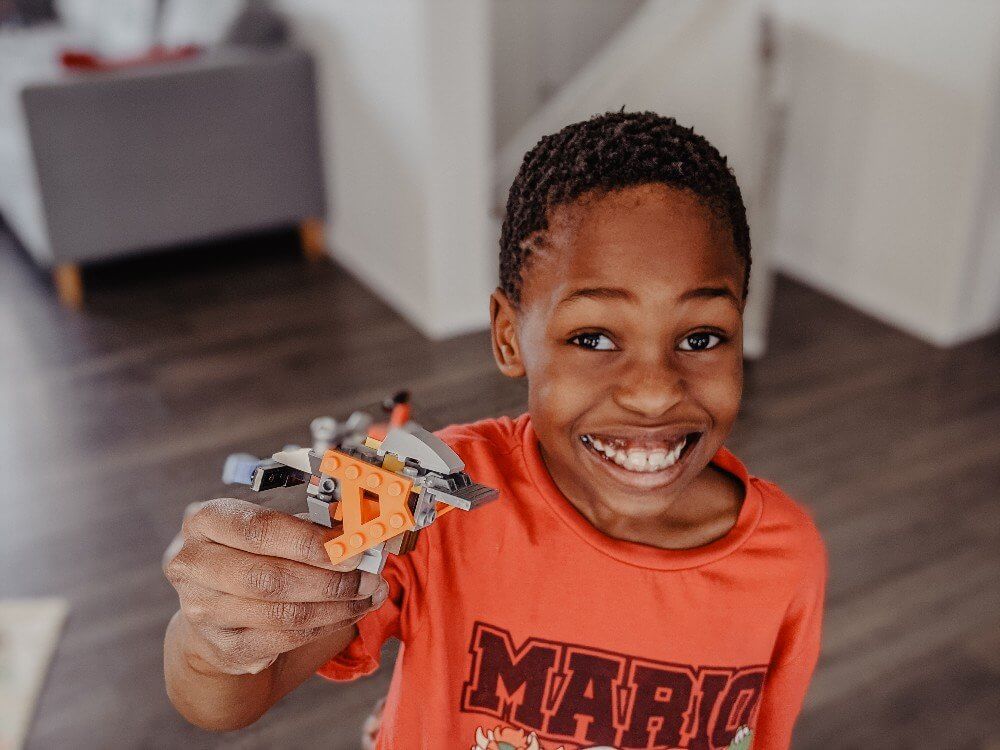
How Do You Start Unschooling?
Ever since I officially declared us unschooling I have gotten a lot of questions on how to start. I’m definitely no master on this but here’s my option.
I would say start by figuring out at least one interest that each of your kids have and gather materials so they can learn more about the topic and let them dive as deep (or shallow) into the topic as they want. If they decide they want to learn about something else, then move on, if they decide they want to learn more, find even more resources on the topic.
If you are feeling leery about unschooling I would suggest deciding to try the method for something like three months and during that time keep track of every time you see your kids learning. Then at the end of the three months do an evaluation and see if the method is for you.
Can Christians Unschool?
Honestly, it shocked me when I first came across this question when I was researching homeschool methods. It hadn’t even dawned on me to ask this question but as I have had time to think about it I think there are a couple of reasons this question comes up.
First of all, one of the main concepts for secular unschooling is the idea that the child knows best and that is why unschooling works. As Christians we believe differently, we believe that God knows best, and that is why we help our kids learn more about their interests, because God has given them each different gifts, strengths and abilities. I want to help my kids to strengthen the areas they are already naturally gifted in so they can start using them to serve Him as children and will be ready to continue serving as an adult.
In our home we believe it is important not only to model a life lived for Christ but also to teach our children about it. As Proverbs 22:6 says: Train up a child in the way he should go; even when he is old he will not depart from it. For us that means teaching them the Bible, making sure they are spending time reading (or listening) to it, memorizing verses and of course, modeling a life for Christ.
In big part we take our role as parents much like Jesus did with his disciples, we are together all the time, eat together, go through hard times together and use learning opportunities as they occur.
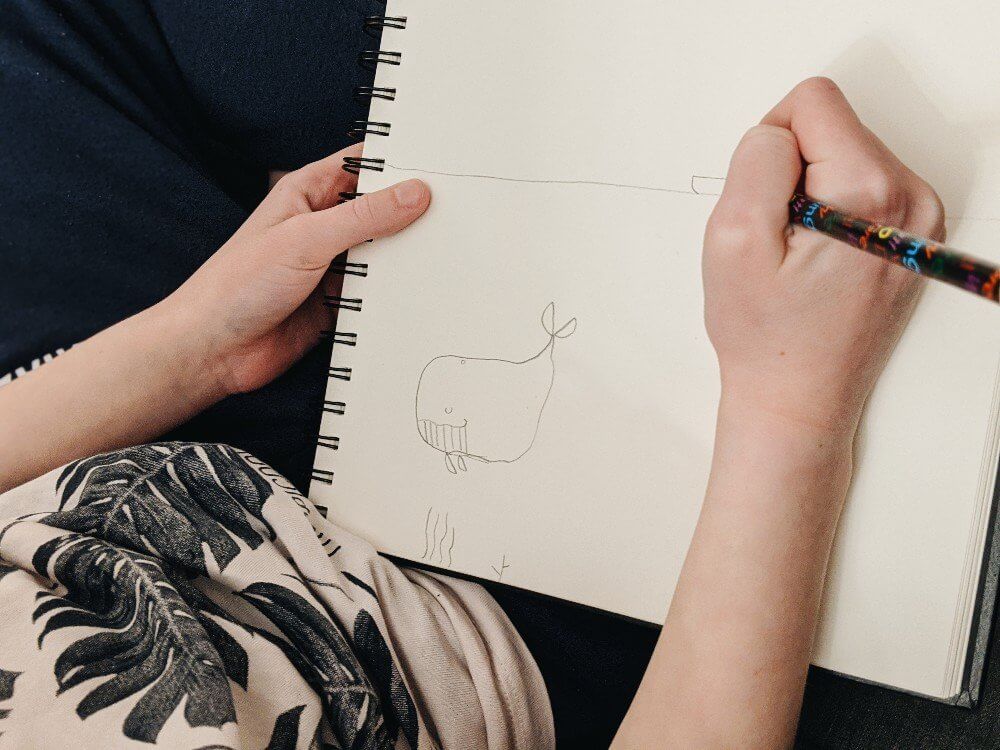
What if my Child likes Workbooks or Wants to Use a Curriculum?
I was really hung up on this question myself for a long time. I felt like if we were using workbooks or following any kind of curriculum we weren’t unschooling. But this isn’t necessarily the case. It really depends if you are using workbooks because you as the parent wants to or because your kid wants to.
If your child wants to learn more about a topic and they want to use a workbook or online class or curriculum to do so, that’s still unschooling! That’s them taking a subject they want to learn more about and running with it.
It’s when workbooks and curriculum are forced on a child that it gets away from unschooling.
What About Kids Who Just Want to Play on Screens?
This is a common question when it comes to unschooling. Like I previously mentioned when I shared about how unschooling isn’t un-parenting, we still have limits on screens in our home.
Our screen limits change throughout the year. Our winters in Saskatchewan are pretty long (they last six months of the year) and we often have weeks on end where it is -30 or colder. During these times I allow a lot more screen time than during the summer when the weather is beautiful.
That being said, I have one child who thinks no amount of screen time is enough time and would just play them all the time if he could. It’s pretty much because of him that I limit screen usage because my daughter often doesn’t even use all the screen days available to her. Different kids will respond different with screen time.
I do consider some screen time different than others. To me “screen time” is playing game or watching something, for that we have limits. But if a child wants to write a story out on the computer I don’t consider that screen time.
So, we have limits on screen time in our home and at times we even have a week where we have no screen time. These limits help but if your child is struggling to figure out what to do when they can’t play on screens, I’ll address that in the next section.
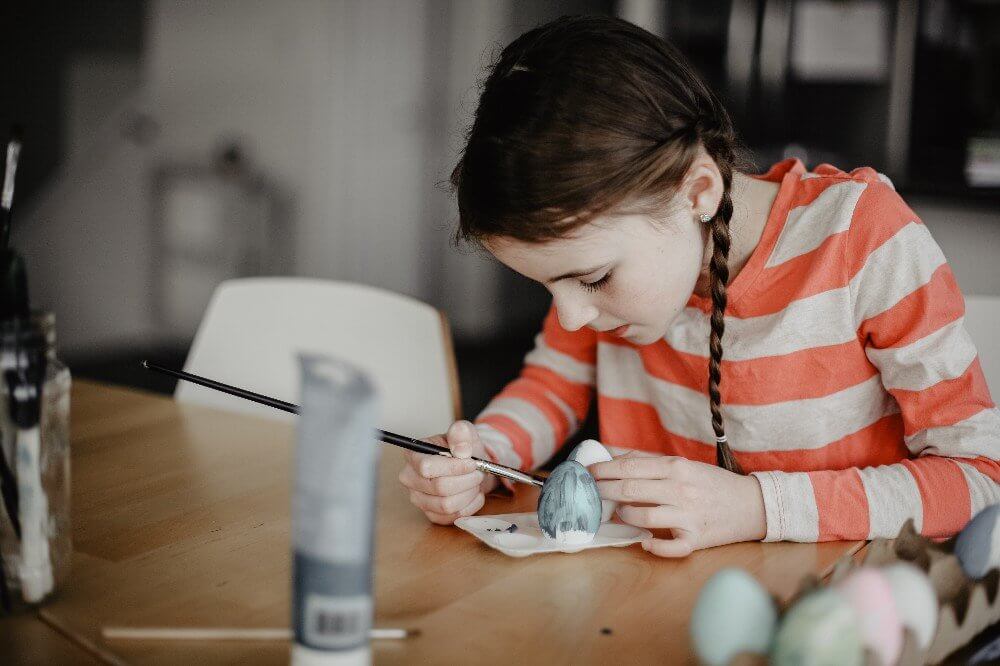
What if my Kid isn’t Interested in Anything?
Since unschooling is mainly about following a child’s interests there is a fear that a child isn’t interested in anything and therefore won’t learn anything. As a parent I feel like one of my main roles is paying attention to the strengths and interests of each of my children. Sometimes a child doesn’t even know what they are good at or interested in but we can help them by telling them what we see.
If your child does not seem interested in anything you could help by exposing them to more topics, activities, etc. One thing I often do when we go to the library is pick up a bunch of books I think my kids would be interested in and then just lay them out on our coffee table for the kids to find. I don’t force them to look at or read the books, I just wait for them to notice them and see which books they gravitate to. If they gravitate towards a book on the human body then the next time I go to the library I might try to get more books on that topic.
One thing I like to do is set up super simple activities to do with my kids on a regular basis. Ideally I would like to do these activities about four or more times a week but with the way life is right now with a toddler and baby it happens closer to three times a week. These simple activities can be anything from giving them some mini marshmallows and toothpicks and telling them to build something to giving them a Lego challenge to doing a craft with them, to a science experiment to creating an escape room. I don’t go into these activities with any pressure to hit any type of school subject or anything that I am expecting them to learn and that really helps me do not feel overwhelmed and it makes it more fun for everyone.
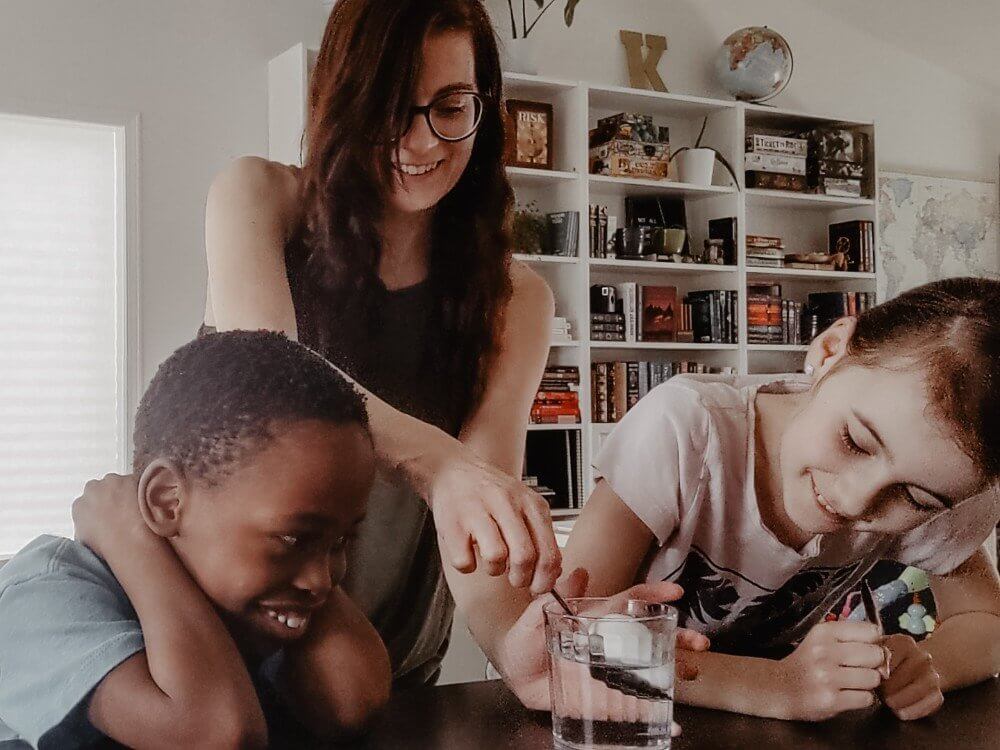
A Day In The Life
I hope to make day in the life videos a regular occurrence, here’s the first one:
If you want to see more day in the life videos and the like, I would love it if you would head over to YouTube and subscribe to my channel!
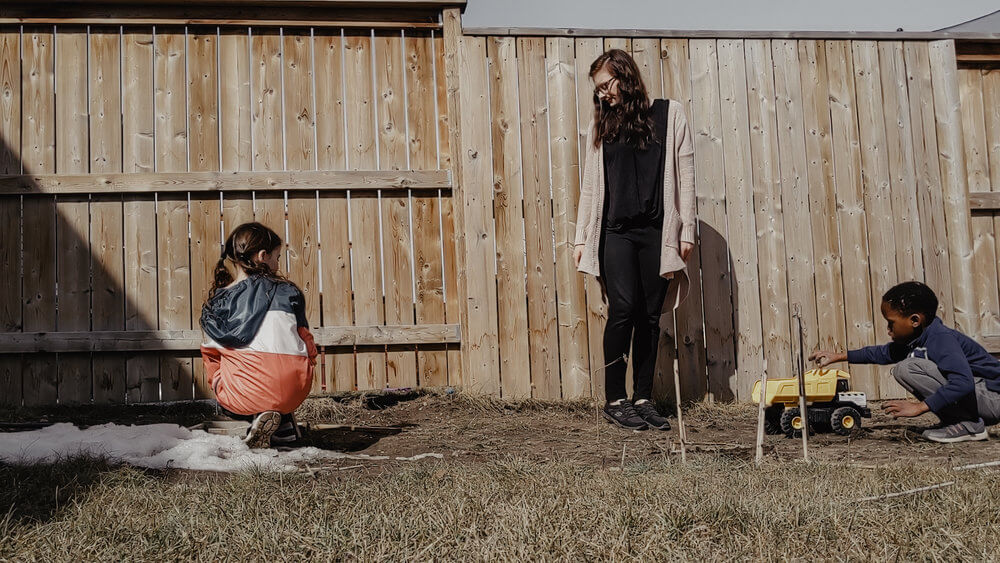
What if my Child Just Wants to Play?
This was a question I struggled with myself for quite awhile. I used to have a hard time getting my kids to “start school” because right after breakfast they would head downstairs or outside to play together. The mornings seemed to be the times they played the best and by the afternoon I often ran out of steam to get them to sit down and try to do some stuff.
It wasn’t until I really stopped to think about play and watch and listen to how they played I realized how much children are learning and working out what they’ve been learning as they play. My daughter will take everything she’s been reading about, hearing about, watching, etc and use it when she is playing. Often the kids will play house but most often they play with Lego and they build and play out what has recently been going on. If the Coronavirus is breaking out in the real world, it’s breaking out in the Lego world too. If they’ve just watched a movie about a guy going to Mars, they make Lego on that theme too.
In the land of structured extracurricular activities we’ve forgotten about the benefits of play. There are a number of books on this topic but one that I read years ago is The Power of Play.
I address this concern a bit in a recent video:
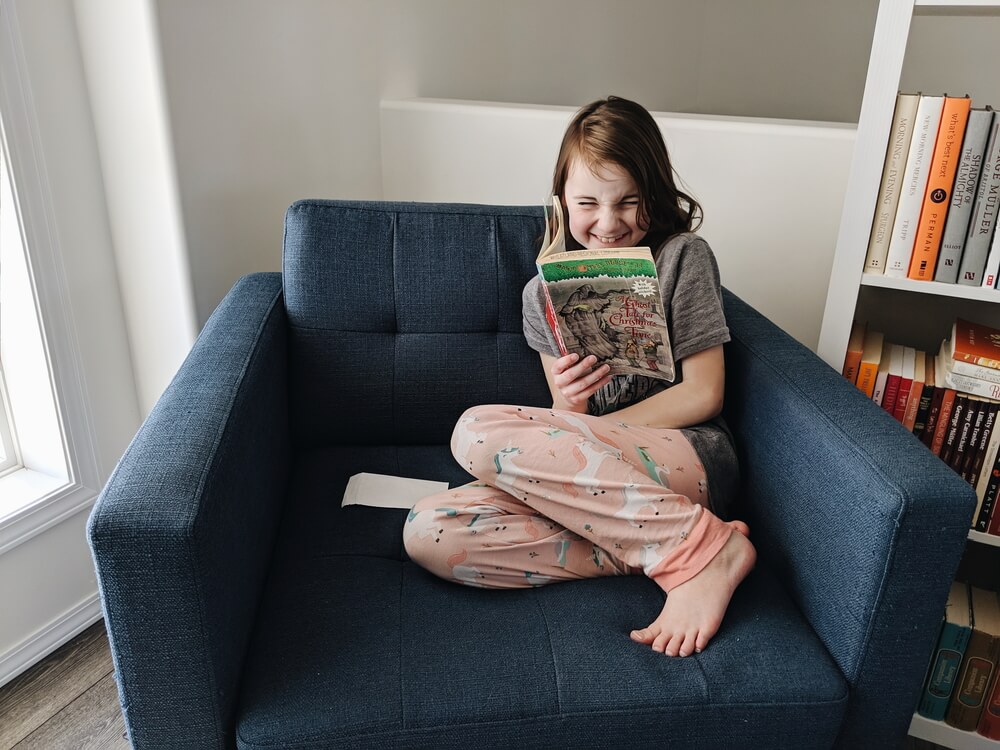
Our Secret Weapon (& How to Implement It)
Our secret (okay, not so secret) weapon when it comes to homeschooling is: books.
I use books as a way to expose my children to a variety of different subjects. My main academic goals for my kids are: 1) to know how to read and 2) to know how to learn. If you can read, and you know how to learn you can find the answer to anything. I am sure we all were left with some holes in our education but now if we want we can go and fill them in. I’m sure my kids will be left with some holes, but if they know how to read and where to look to find answers to their questions they can fill the holes pretty easily.
I love it when my kids pick up books on their own but I have two methods on how I increase their consumption of books:
Audiobooks
We always have an audiobook we are listening to together. For the most part we listen to audiobooks at mealtimes because it’s a time when we are all together, it cuts back on excess chatter and it drowns out any chewing noise kids may be making.
My kids both listen to audiobooks on their own as well. They both have tablets with our library apps on them and a pair of headphones. I’ve set them up so they have books they are interested in ready to go (many of which they have listened to many times over).
Strewing or Spreading the Feast
Another way I expose my children to more books is by strewing, or spreading the feast. The idea is intentionally leaving materials out for kids to look at/pick up at their leisure. I do this a lot with library books, I’ll pick a few off the stack that I think the kids will be particularly interested in and lay them out on our coffee table for them to pick up if something catches their eye.
I do the same thing with books that we own that are more resource type books. I normally store them in a cupboard, that the kids are free to access when they want to, but because they are in a cupboard they often don’t think to get them out. So, every now and then I’ll pull one, two or three of them out and do the same thing; set them on the coffee table and see what they pick up.
If you start strewing books and resources, pay attention to what types of books and subjects your kids are drawn to, that’s part of finding out what they are interested in.
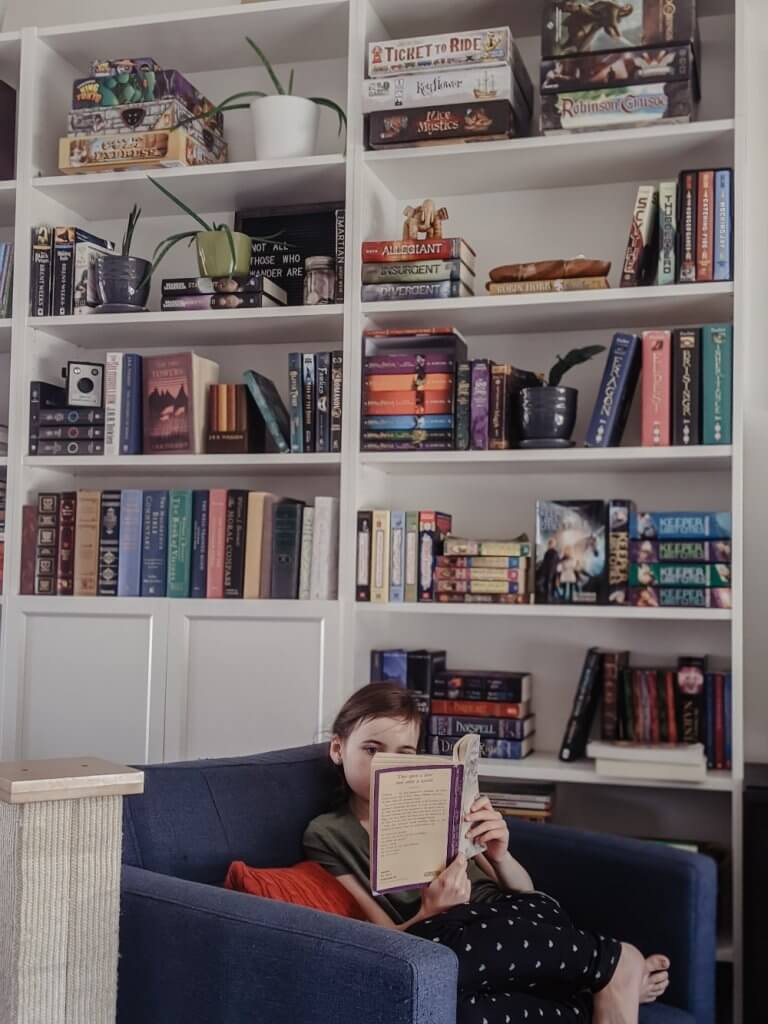
What About Reading?
There are a few subjects and things that people worry about when it comes to unschooling. Reading is one of them.
Honestly, reading is one of the things I most want my kids to do and also one of the things I am least worried about.
Why? Partly because they see it as something both their parents choose to do for fun on a regular basis and partly because the need to read is everywhere.
When a child is interested in reading, teach them to read! Years ago I bought the book Teach Your Child to Read in 100 Easy Lessons and I used it for both my kids. They took different lengths of time, we didn’t follow the book completely, the lessons weren’t always easy but they both learned to read!
We also do a lot of reading in our home, I read picture books to the kids right from the beginning, we listen to a lot of audiobooks together during meal times or while driving, the kids listen to books on their own and we have a lot of books in our home.
Yes, reading is important, but they will learn it. The nice thing about homeschooling and unschooling is that kids can learn to read without the pressure of feeling like they are “behind”. Some kids take a little longer to get to a comfortable reading level and that’s fine, but it can make kids feel insecure if they know they are behind.
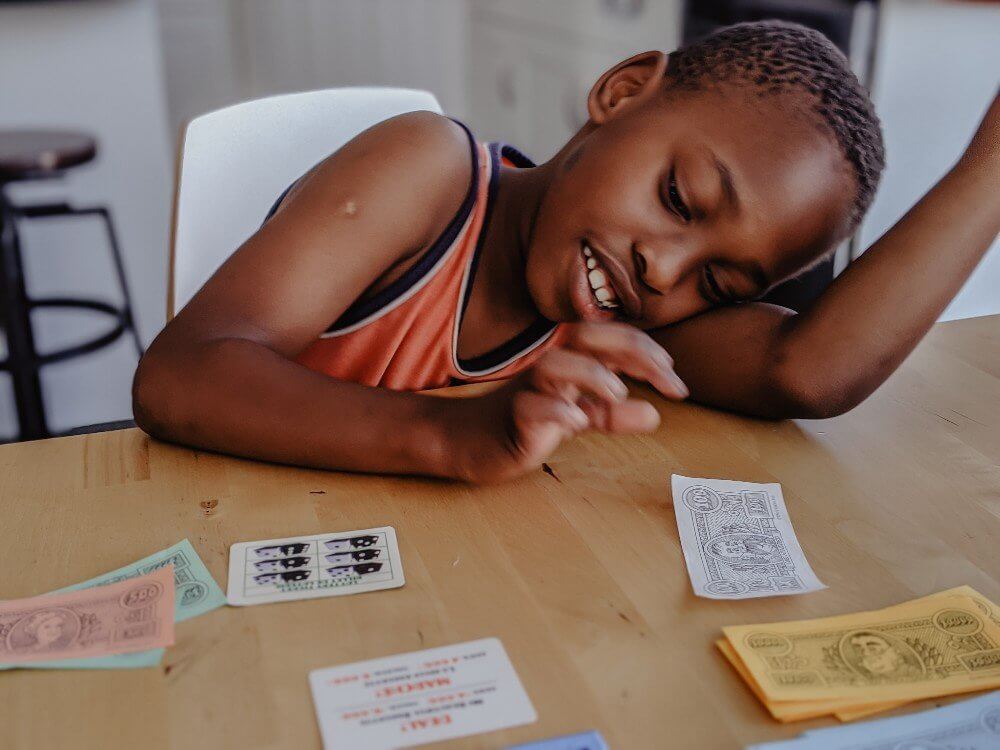
What About Math?
I think it’s safe to say this is most people’s biggest concern when it comes to unschooling.
I recently posted this about math on Instagram:
My main thoughts on math are this: what kind of math does the average person do on a daily basis? It would be what we would call “basic math”; your addition, subtraction, multiplication and division that you use when baking, buying things, dividing Mini Eggs, etc. How could one learn these math skills and make it not incredibly boring? How about baking, buying things and dividing Mini Eggs! Why math has been demoted to a pencil and paper subject is beyond me.
If you pay attention to how many times a day kids ask math questions you would be surprised! The key when kids ask these questions though is not to give them the answer, but to help them figure it out. Here are just a few recent math questions/thoughts I can remember my kids having recently:
- “If there were 10 rolls of toilet paper in a pack and that lady at Costco bought 30 packs . . . she would have 300 rolls of toilet paper!” – Thanks Coronavirus and crazy Costco lady for spurring this on. Also, there are way more than 10 rolls per Costco pack so I think she’s set for awhile.
- “There are 14 Mini Eggs and 3 of us . . .” And the child went on to figure out how many we would each get.
- “For this recipe I need 2/3 cup, but there is no 2/3 cup, so, I could use the 1/3 cup two times.”
- Counting all the birthday money, multiple times.
- Counting their allowance and money every time it fluctuates.
- Figuring out how much more money they need to buy something or how much money they will have left over.
- Any time they are figuring out how much time until something happens, whether that’s days, hours, minutes.
- “So, I did the math . . .” I honestly don’t remember the math equation was that followed but it cracked me up that so many people worry about math, we do it all the time!
That’s just a brief run down, there are so many math encounters throughout the course of a week, I think it would be fun to try to document them all, maybe one day.
What About High School and College?
I honestly think that high school will be even more fun to unschool! When my kids have figured out themselves a little more and are more tuned into their strengths and interests I plan on taking that and running with it!
As far as college, if they want to go into a field that requires college or university I am fine with that and we’ll do what needs to be done to make sure they qualify. If they need to know math, they’ll learn it. We’ll also look into the requirements for the institutions they are interested in applying for to make sure they can get in.
Right now we are still many years away from this and my kids change their ideal careers on a daily basis but I am honestly not worried about it. I went to college and university and am not using any of that education now!
Unschooling Resources For Parents
I would highly recommend reading the book An Unschooling Manifesto, it’s cheap, short and she does such a good job explaining everything.
Also, I really like this video. I want to give the heads up that the family in this channel are Mormon, so they are not from the same faith as my family but I totally agree with what they have to say about education and unschooling:
Okay, I think that is the end! If you made it this far, I’m amazed, grateful and think you should unschool.
I hope to come back one day and proof and edit and add more but we’ll see if that actually happens. Right now the best ways to stay up to date and follow along with our unschooling journey are to check in on the blog often, follow my homeschool Instagram account, subscribe on YouTube and sign up for the homeschool newsletter.
